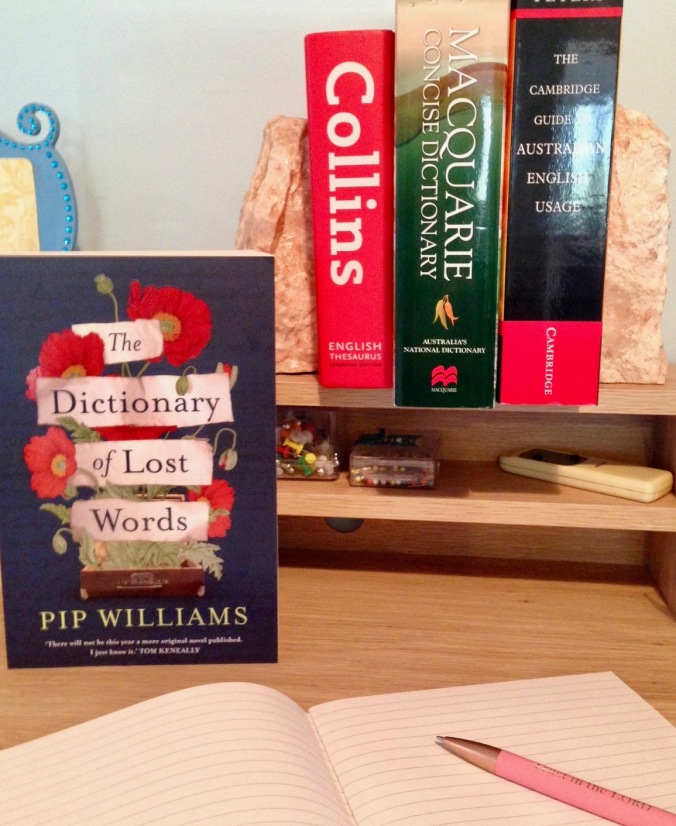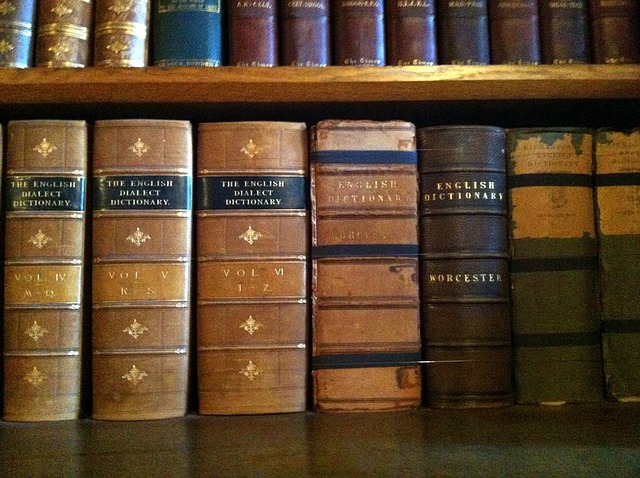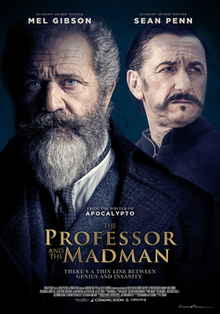
“Words – so innocent and powerless as they are, as standing in a dictionary,
how potent … they become in the hands of one who knows how to combine them!”
Nathaniel Hawthorne
The Dictionary of Lost Words by Pip Williams
In 1901, the word bondmaid was discovered missing from the Oxford English Dictionary. This is the story of the girl who stole it.
Esme spends her childhood in the Scriptorium, a garden shed in Oxford where her father and a team of lexicographers are gathering words for the very first Oxford English Dictionary…One day, she sees a slip containing the word bondmaid flutter to the floor unclaimed….Esme begins to collect other words from the Scriptorium that are misplaced, discarded or have been neglected by the dictionary men…Over time Esme realises that some words are considered more important than others, and that words and meanings relating to women’s experiences often go unrecorded. She begins to collect words for another dictionary: The Dictionary of Lost Words.
The Dictionary of Lost Words captured my attention when we were in QBD the other day. The title was intriguing. I have a thing for words. I like the way they sound; the way they roll over the tongue. I like the way different languages have different sounds and how you can guess the origin of a word by its root or prefix. I find the origin of words fascinating: where they come from, how they are used and how they change over time. I also have a tendency to lose words. I cannot find them when I want them and then they pop up when I am no longer needing them. A dictionary of lost words stoked my curiosity. Perhaps it is where all my lost words will be found.
The cover, illustrated by Lisa White, attracted my attention too. I am yet to read the book but I am guessing that Esme keeps her collection of words in a suitcase. The story is set during the time of the suffrage movement and the Great War, so I am also guessing that the poppies on the front cover mean something too. A quick flick through the book shows that the chapter titles are illustrated on small slips of paper, just like the words that Esme collects. Nice touch. I like it when the design and outlay of a book supports the themes of the story.
The Oxford English Dictionary
The Oxford English Dictionary (OED) has an interesting history. The project of developing the dictionary began in 1857 and was expected to take about ten years and comprise of four volumes. Around seventy years later, in 1928, the full edition of ten volumes was finally published. Obviously they had no idea about the extent of the work involved.
Initially the dictionary was titled A New English Dictionary on Historical Principles; Founded Mainly on the Materials Collected by the Philological Society, and the first volumes were published in 1884. Fortunately for us though, by 1895 the title had been unofficially abbreviated to, The Oxford English Dictionary.
Tolkien buffs may be interested to know that Tolkien was employed by the OED project from 1919-1920 to research the etymologies of the words from waggle to warlock. Not really that surprising, as Tolkien was a philologist – one who studies literary texts and written records, establishing their authenticity and original form, and the determination of their meaning.
Over the next 40 years volumes of the OED continued to be released until the completion of the project in 1928. However, that was not the end. Language is constantly evolving and changing, so within 20 years the dictionary had already become outdated. It was probably already outdated by the time they had finished. So work began on the second edition in 1957. Luckily, this time it only took 29 years! The second edition was published in 1989, comprising of twenty volumes and over 21,000 pages.
It has been calculated that the second edition would take one person 120 years to type its 59 million words (that includes definitions & examples), a further 60 years to proofread and approximately 540MB to store electronically. So it requires a very large team over many years to produce a book that many of us keep on a bookshelf without a second thought.

Edition three is currently underway, but don’t expect to see it in print any time soon. Work was started in the year 2000 and by 2018 they were halfway. At the rate English continues to evolve and change, the third edition will be well out of date long before it is even finished. However this one is likely to only be an electronic edition so at least updating it should be a much easier project.
Over the years there has been some criticism of the OED, particularly for its conservatism and “prudish Victorian morality”. Certain four-letter words were not included until 1972 on the grounds it might contravene the British obscenity laws. This was despite the fact that these certain words had been in usage for centuries.
I don’t actually have an Oxford dictionary on my shelf. Living in Australia, I use the Macquarie Dictionary – Australia’s National Dictionary. It is described as being both international and uniquely Australian. My edition is a hefty 1427 pages and that is the concise edition! Also on the shelf is a Collins English Thesaurus, for when you want to impress your lecturers with long words, which itself is over 900 pages. The third book is not exactly a dictionary, but is The Cambridge Guide to Australian English Usage. It explains how we tend to use words here down under, as well as giving some pointers on grammar and punctuation. And yes, Australian English is a thing.
 Dictionaries have become a topic of interest in recent years. In 2019, “The Professor and the Madman”, starring Mel Gibson & Sean Penn, was released. It was an adaptation of a book published in 1988, The Surgeon of Crowthorne by Simon Winchester, which focused on the relationship between James Murray, a director of the OED project and W. C. Minor, one of the dictionary’s main contributors, who was incarcerated in an asylum for the criminally insane. Unfortunately there were some legals issues with the film and it attracted mostly negative reviews, but it does sound very interesting.
Dictionaries have become a topic of interest in recent years. In 2019, “The Professor and the Madman”, starring Mel Gibson & Sean Penn, was released. It was an adaptation of a book published in 1988, The Surgeon of Crowthorne by Simon Winchester, which focused on the relationship between James Murray, a director of the OED project and W. C. Minor, one of the dictionary’s main contributors, who was incarcerated in an asylum for the criminally insane. Unfortunately there were some legals issues with the film and it attracted mostly negative reviews, but it does sound very interesting.
We often don’t give a second thought to dictionaries and the years of tedious and precise work required to create such an essential resource. They sit on our shelves until we are stumped by a word or can’t quite remember how to spell a tricky one. There is also the matter of which words are important and which are now obsolete, but William’s novel, The Dictionary of Lost Words, brings attention to the words that were discarded or overlooked, because they described the experience of those who did not matter. I am looking forward to reading this one.
Happy Reading!
The Dictionary of Lost Words is a book that has also caught my attention, and it does have a lovely cover. Language and its changing, evolving nature is such a fascinating topic. The idea of how the language of women could be neglected is intriguing.
LikeLiked by 1 person
I think with more recent attention on the way that history is recorded and by whom, it brings attention to other areas in which the voices and experiences of the Other have also been overlooked – dictionaries, encyclopaedias and other collections of knowledge, medicine for example. I am hoping it will be a good read.
LikeLike
I had tickets to see The Professor and the Madman when we went into Lockdown. It was only playing at selected cinemas because :
– no car crashes
– no aliens
– and no one gets Killed.
Despite negative reviews I think it would have been interesting 🙂
LikeLiked by 1 person
Yes, it’s the exciting, action-packed, violent films everyone wants to see, not the interesting ones. Perhaps I’ll track down the DVD.
LikeLiked by 1 person